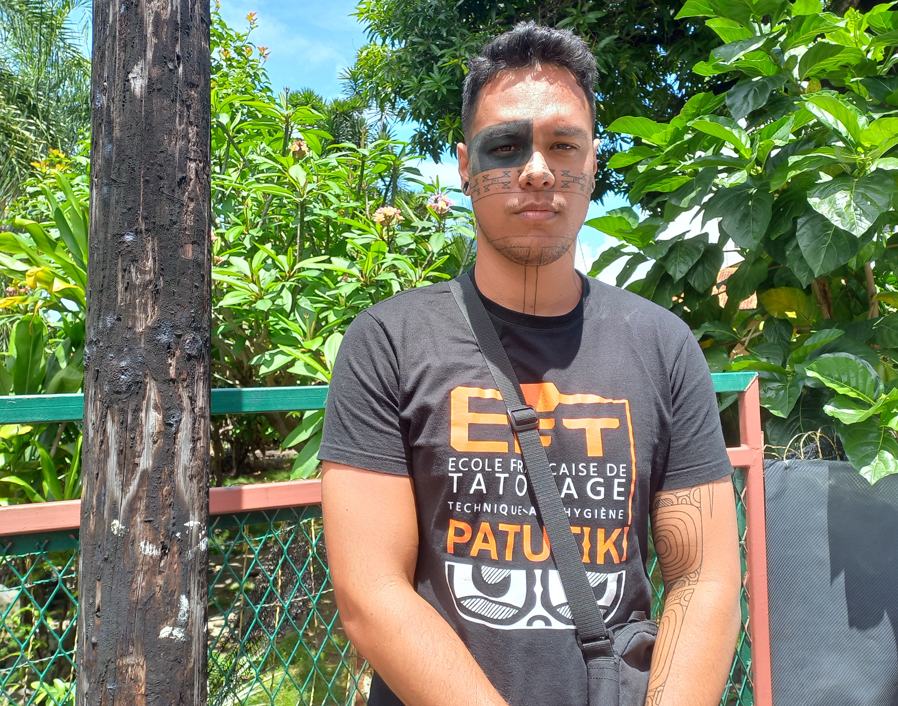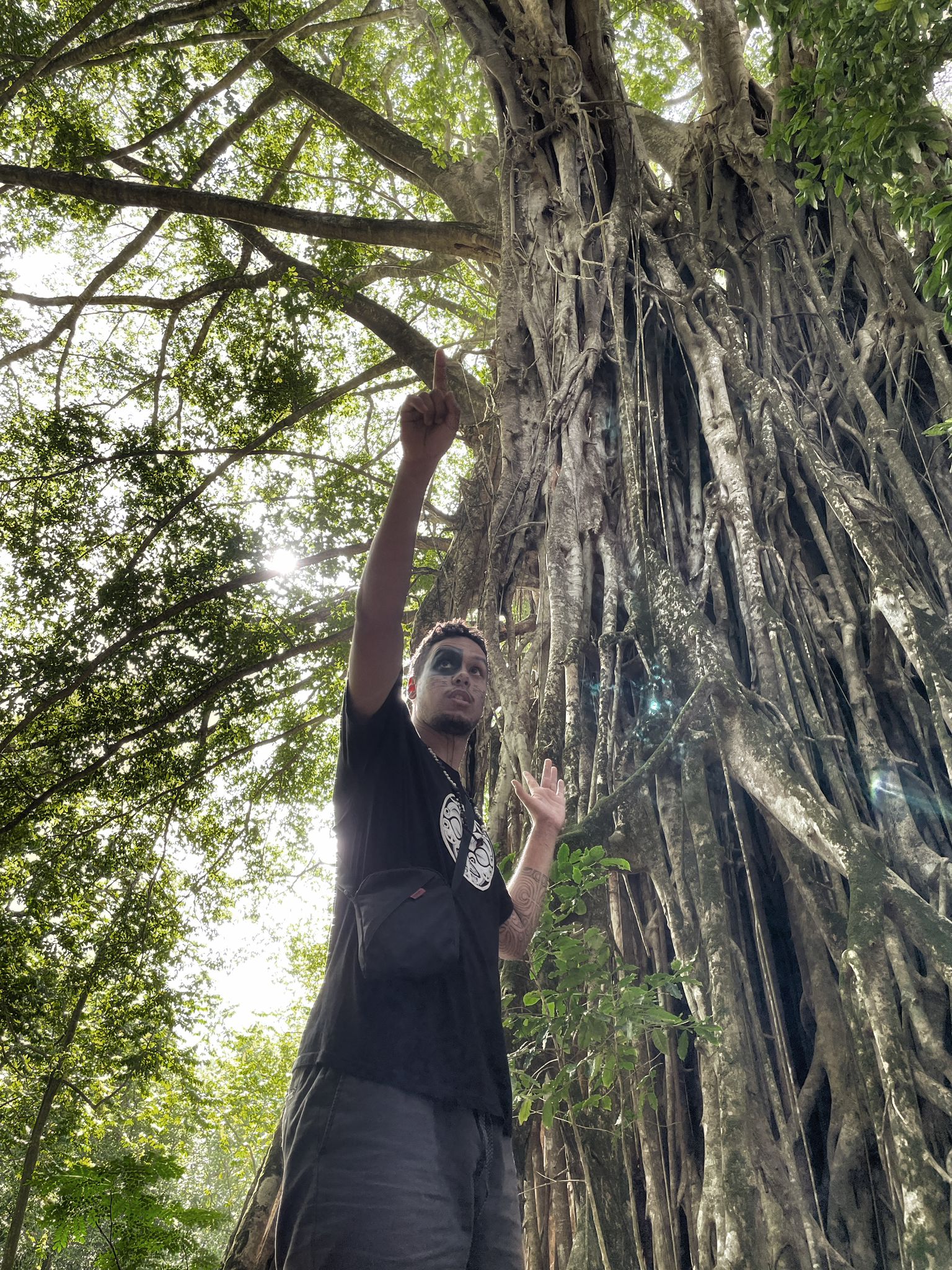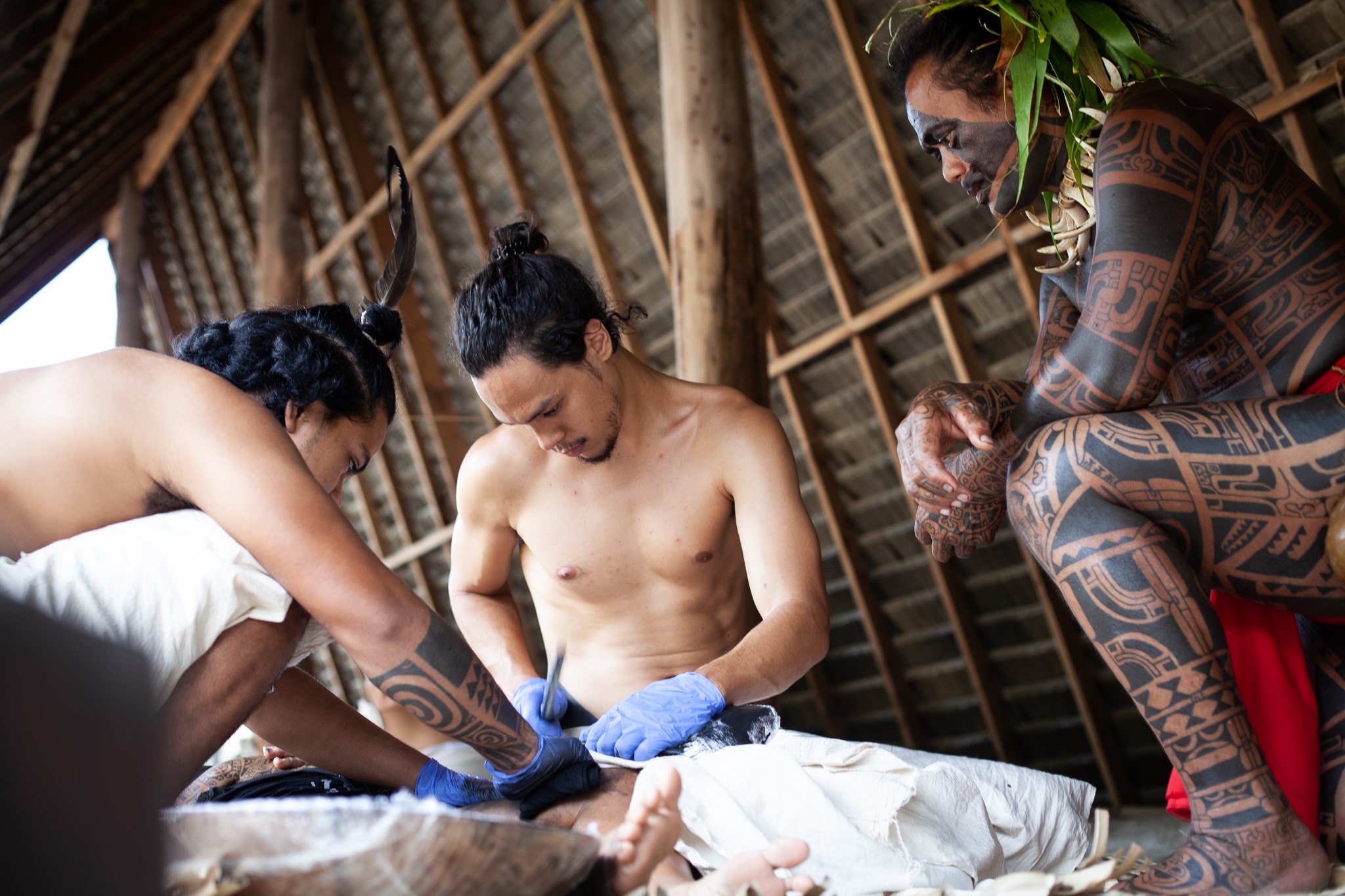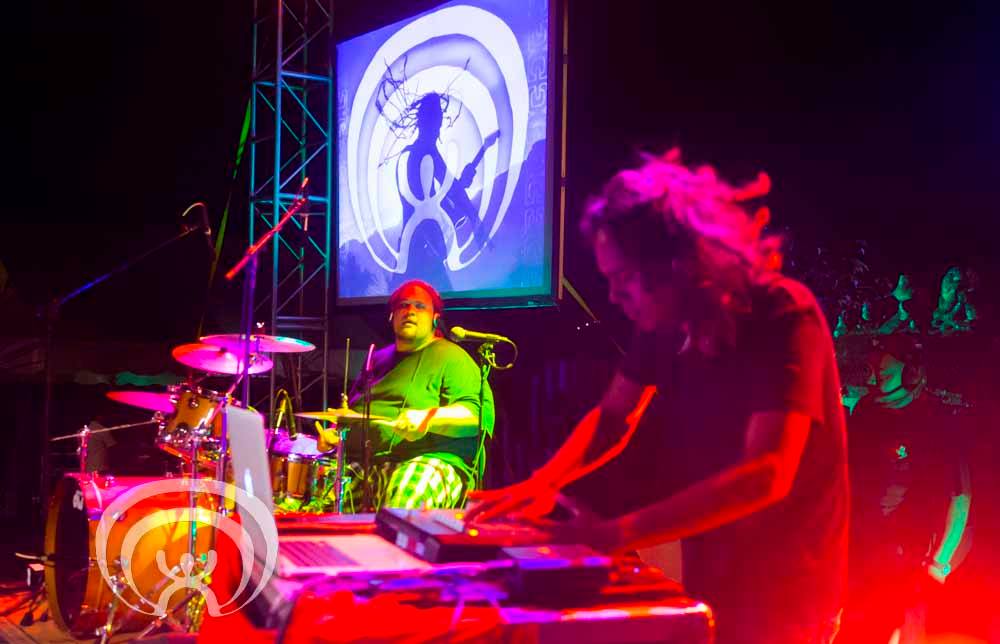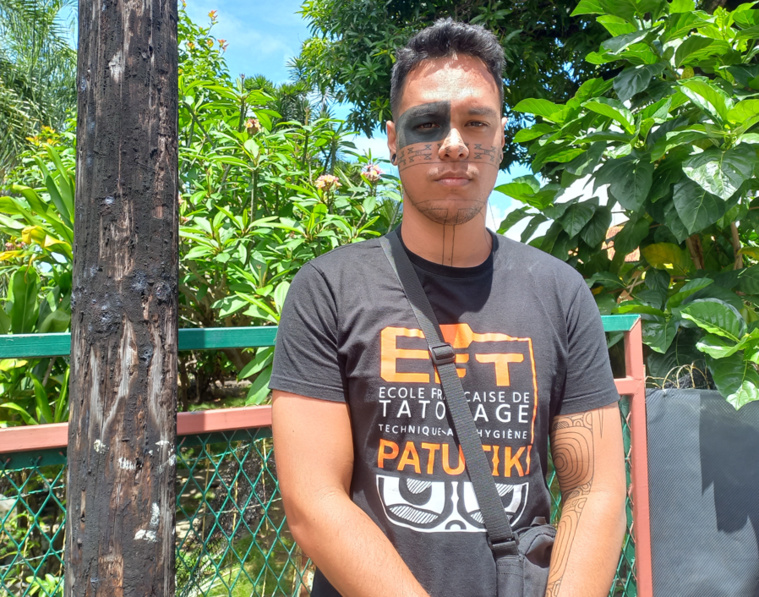
His father is Marquesan, his mother French. He was born in Paris in 1992. But it was in Anaho, a valley from Nuku Hiva to the Marquesas that Heretu Tetahiotupa found his way. It is there that its double roots, reconciled, make sense.
At the age of 3, he returned with his family to live in Polynesia. He spent a little over a year in Tahiti, then left for the Marquesas. His father was an administrator, the family received “of the big world”. Later, he enrolled at La Mennais high school where he obtained a scientific baccalaureate. He admits to having been gifted at school, attributing this to his great curiosity. “I remain amazed by everything, I like to learn. I absorb any new information.”
At 18, he took the direction of France. He continued his studies in Strasbourg, in musicology. “I wanted to be an artist, a musician in fact. Back then I was mostly into music.” He thinks, beyond his learning, that this choice will be “positive”. “I told myself that by moving away from my family, my loved ones, my environment, I was going to have a revelation, I was going to find meaning in my life..” But the revelation does not come, “in any case, not as I expected.”
“I became aware of the richness of Polynesia”
He does not appreciate his metropolitan experience. First of all, the climate is difficult to bear. For months, he struggled with low skies and gray days. “It was oppressive.” Heretu Tetahiotupa grew in the sun, “under a blue and endless sky”. He explains : “My body reacted badly. It was physiological.” And then, the temperament of the people did not know how to please him. “People are still less friendly.” He who saw his island as a kind of prison bounded by the ocean finally opens his eyes to the treasures that his native land contains. “By experiencing a life abroad, I became aware of the richness of Polynesia. “At 19, he is back home.
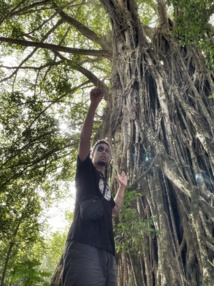
He enrolled at the University of French Polynesia in physics and chemistry. “I have always loved the arts and sciences”, he explains. The sciences, for him, being “a promise to understand the secrets of the universe.” During this period, he remains a little lost. He is at this crucial age of transition to the adult world. He notes that today, in many societies, there is no more ritual. “No one to accompany us. So we slip, we bump, we improvise as adults.” Heretu Tetahiotupa notes a discrepancy between his projections and reality. He will have needed time to understand what surrounds him, to understand himself. “The documentary Patutiki, for this, played a very big role.”
At university, he made an appointment with the guidance unit “which helped me a lot”, he recalls. He talks about his interest in the arts and sciences. “Why not try audiovisual?”, suggests the orientation unit. In 2011, he completed an internship in the production department of a local television channel. He rediscoverslots of stuff I was already doing, for fun.” As a teenager, he had fun making short video montages. During the course, he also lends his unique voice. In 2012, he took out a license and worked regularly for the channel. “Which I liked.”
In addition, Heretu Tetahiotupa sings and plays the guitar in the bars and nightclubs of Tahiti. “We had set up a training with a friend.” He covers music, but it doesn’t quite suit him. He seeks to create something relevant, “i.e. original”. Now, what could be more original than the individual himself? His quest for identity takes more and more space. He knows that buried deep inside him is his Marquesan part, but he doesn’t understand it yet. “I actually avoided it.” At that time, Heretu Tetahiotupa also set up the Lucid Dream collective. In 2013, this collective was rewarded for two short films at the 2nd edition of the Vini film festival: Tikaito (Grand Jury Prize and Audience Prize) and Make the Kitchen (prize for best director).
A moving stay
In 2013, Heretu Tetahiotupa spent a vacation in the Marquesas. His parents have an isolated house in the Anaho Valley. No road serves the fa’e,”we go there on horseback, or on foot, as I did for a long time. Today I have an electric bike”, he admits. He stays there for a few weeks. This return to his roots upsets him.
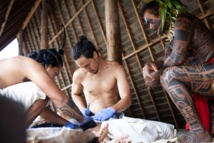
In Nuku Hiva, he reunites with childhood friends who have remained behind.in culture, music, dance”. He records sounds that he mixes with those he brought from Tahiti. There is something really new here. Something clicks for Heretu Tetahiotupa. He is emotionally touched. “Except that I didn’t know the tools of this creation, the rhythms, the music, the language and all that they meant.“He wants to use them but without leaving anything to chance.
Destroy to rebuild
In 2014, he decided to settle in Anaho. “A real life changer.” He (re)puts his hands in the ground. He makes copra, hunts on land, initiated by friends, and at sea as he did with his father when he was little. “I accompanied him when I was 6, 7 years old, I always liked apnea. I held up well underwater. I stayed on the kayak, but did some underwater descents during the fishing trips.” He begins to learn Marquesan. In the house is a large library that feeds him. He admits having grown up, attracted by the West, lulled by the rhythms of Jimmy Hendrix and the thoughts of Spinoza and Nietzsche. In Anaho, in the family home, he devours all the writings related to the Marquesas. He cites the work of Marie-Noëlle and Pierre Ottino-Garanger, “family friends”. He talks about his uncle Edgar Tetahiotupa who offered him keys to understanding Marquesan culture. “All of this gave extraordinary value to all those things that had seemed trivial to me until then..” He explores since his installation in the Marquesas the culture of his ancestors.
For Heretu Tetahiotupa, there is no break between art and spirituality. This now affects every move he makes. He says he arrived in the Marquesas with a lot of anxieties, problems that belong to modern civilization. He got rid of it all, got “cared for”. He destroyed everything, then rebuilt everything. “I’m having a blast exploiting it all.” He has found a balance. In Western society,we mentalize and we categorize”, in Polynesian society in general, Marquesan in particular, “we connect, we make links. We have a holistic approach”. However, he does not reject his double culture. The two are intimately linked. He uses the tools and concepts of one to maintain the universality of the other.
“I was there for that”
He tells how with Teiki Huukena, met in 2015, he went to meet witnesses in the valleys. “I love Teiki’s approach.” The documentary Patutiki, the art of the Marquesan tattoo, has its source there. “When he started talking about it, I understood. I knew I had something to do in the Marquesas, that was it, this project. I was there for that.“The documentary was made with Christophe Cordier.
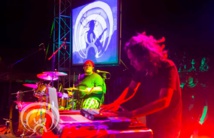
Heretu Tetahiotupa and Teiki Huukena were able to meet 70 people. “Among them were children of the last tattooed Marquesans.“The interviews are the breeding ground of the documentary. Heretu Tetahiotupa, at the time, is not tattooed. He covered his body with carefully chosen patterns, drawn and placed as he learned and made the documentary. Once the latter was completed, it was screened in 23 valleys of the six Marquesan islands as a preview. Heretu Tetahiotupa made another documentary from these screenings.
The documentary by Heretu Tetahiotupa and Christophe Cordier, produced by Les Studios hashtag, Eka Eka productions, Association Patutiki and Sydélia Guirao, was presented at the International Oceanian Documentary Film Festival (Fifo) in 2019. It won the audience award . This is the price of the heart for festival regulars. Heretu Tetahiotupa said, after the award ceremony, “it’s my first movie so i had no expectation but it’s really amazing.”
In 2016, he participated in the organization of a music festival in Nuku Hiva. During the event, he plays with his Marquesan electro rock band called Kiva. It is for him alaboratory”. He does not distribute his creations because he considers that he does not sufficiently master his creation tools. Today, he is ready and this is added to the long list of his projects.
“An honor.” And a “big responsibility”
In 2021, Heretu Tetahiotupa participates in the opening of the tattoo school in the Marquesas. A first session of 12 students was able to follow courses given by different professionals for ten months. The next session could start in 2024. He himself tattoos a lot in Nuku Hiva, sometimes in Tahiti. He says he has an ethno-anthropological practice of his activity. He works “as the ancients did”. He finds no interest in making tattoos according to today’s principles. The practice of patutiki respects codes, a language, a grammar, a vocabulary. So many constraints that limit an “almost infinite” creative path. To hear Heretu Tetahiotupa, in this context, everything is possible, or almost.
Requested by the author Patrick Chastel, in 2022 he will also produce the illustrations for a book of Marquesan legends which will be released in a few days. He is going to participate in a visual arts exhibition which will be organized in Tahiti in 2023. He is working on his paintings. He makes short documentaries for broadcasts in New Zealand but refuses any other major project. In February 2022, he became the president of the organizing committee of Matavaa o te Henua Enata (Comothe). “An honor.” And an “big responsibility”. Preparations for the Marquesas Festival in December 2023 have started. “It’s very rewarding“, he said with visible gratitude, “this seems to me to sanction all these years of research”. It’s a challenge, one more stone in the collective construction of the Marquesan people, but also in the personal construction of Heretu Tetahiotupa.
Written by Delphine Barrais on Wednesday November 2, 2022 at 7:21 p.m. | Read 361 times



